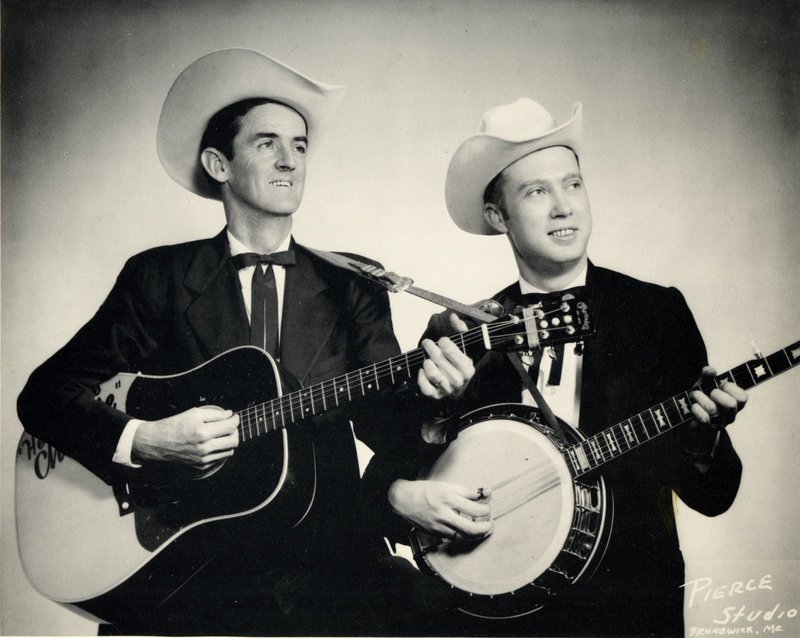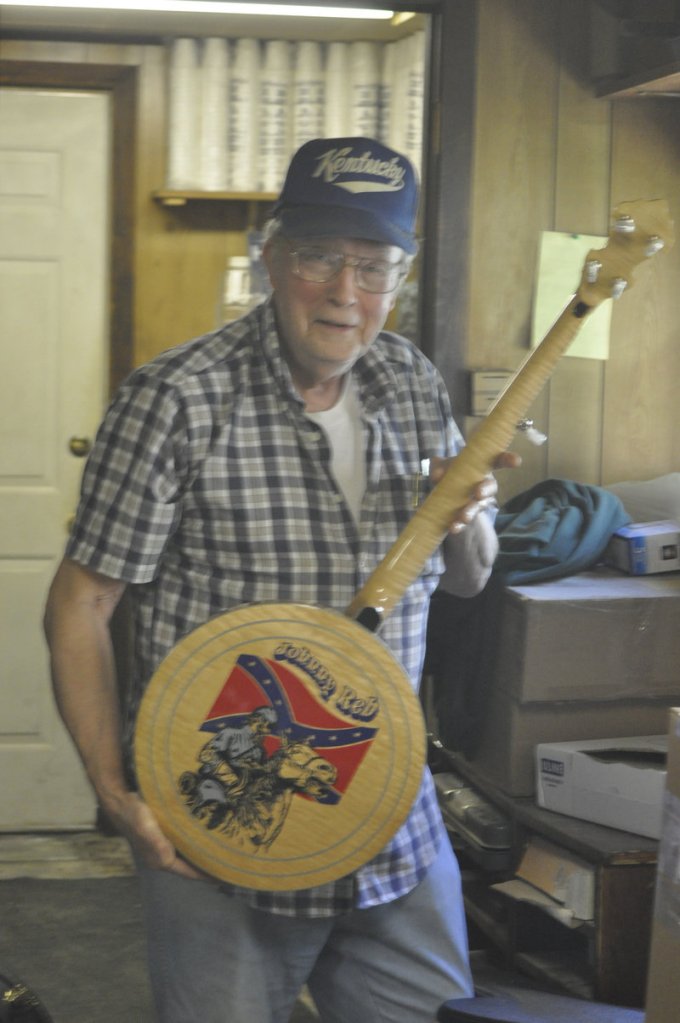Standing in the tight quarters of his workshop in Topsham, Jimmy Cox takes out one banjo after another, holding each as if it were an extension of his own body. In a way, they are.
Cox, who celebrates his 78th birthday on the same date that bluegrass legend Bill Monroe died (Sept. 9), has been building banjos for close to 50 years.
He pulls out a black case from a row of black cases, sets it on a chair and lifts the lid. The banjo inside gleams, cradled in red velvet. Cox lifts it out of its case and flips it over. The curly maple resonator looks like silk rippling in the light. A Confederate army field commander on horseback is superimposed on a Confederate flag under the words “Johnny Reb.”
It’s a Cox Johnny Reb banjo — one of seven models Cox has crafted over the years. Only four Johnny Rebs remain for sale from a limited edition of 20 — one for each field commander in the Confederate army. Chuckling, the native Kentuckian says he’s sold more of the Johnny Rebs to folks up north than in the South.
Jimmy Cox is a first-generation bluegrass musician. As such, he’ll join other bluegrass pioneers next month in Kentucky to celebrate the father of bluegrass — Bill Monroe — on the 100th anniversary of Monroe’s birth.
Cox was born the eighth child of 12 in Daniel Boone country. His father worked in a coal mine and the family grew or hunted most of what they ate. Medicines, too, came from the land. There was no electricity at home — and no flushing toilet, either, until he put one in while visiting home on a break while serving in the Air Force.
Music was the prime form of entertainment and was everywhere, Cox says. His father taught him to play the banjo, and over the years, he picked up organ, mandolin, violin and guitar, but it was the banjo he always loved best and would turn out to be — aside from his family — the center of his life.
Growing up in Kentucky, Cox learned to play banjo two-finger style. When he was in high school, Cox saw bluegrass banjo player Earl Scruggs perform. He’d heard Scruggs on recordings and had been trying to figure out how he got his sound, so he got close enough to him that he could watch how he played and learned that Scruggs used three picks, not two.
Cox has played the banjo all through his life — he began playing on local radio when he was only 10 — but he didn’t start building banjos until the 1960s. By then, he’d married a woman from Maine, Yvette LeBlanc, whom he’d met while he was stationed in Presque Isle, and settled in Topsham.
“Bluegrass wasn’t up here at that time,” he says. “I really had to make some instruments to play.”
He formed his own bluegrass bands and taught students how to play banjo. His handmade banjos became more and more in demand. He told his wife that whenever his banjo business earned him more than he was making working at Maine First National Bank in Brunswick, he’d quit his job. That day came in 1965.
Cox was in his element. Growing up on a farm, he had learned to get creative with the equipment, and his years working on jet engines in the Air Force gave him the machining skills needed to make just about every part of a banjo.
“I’m probably the only one in the world that’s even made every part of the banjo,” he says. Even today, with the help of his grandsons, he still uses “stone age” equipment. “This is all made with horse sense,” he says. “There isn’t any technical stuff.”
“I’ve been invited into (modern banjo making shops),” he says, but he never goes in them. “I don’t want to see how they do it.”
“Jimmy is stubborn, and I say this in respect, he’s determined,” says Al Hawkes of Westbrook, a longtime friend and fellow musician who is best known for championing country music in Maine. “He’s got a certain thing he wants to do, a certain style, a certain accomplishment he’s looking for. He’s (dogged). He goes right at it. I admire him for that.”
Hawkes and Cox were two of the first performers of bluegrass in Maine, and like Cox, Hawkes, at 80, is still performing. The two friends are both inductees of the Maine Country Music Hall of Fame and have been recognized by the International Bluegrass Music Museum of Owensboro, Ky., as pioneers of bluegrass.
“Jimmy’s a real important person,” when it comes to his contributions to bringing bluegrass to Maine, Hawkes says. “Jimmy has been so influential through teaching the banjo, building the banjo and being the kind of guy he is — knowing where bluegrass came from and how to spread it here in the state of Maine.”
Cox organized the first bluegrass festival in Maine in 1972, released three albums, and performed on TV on the Ken MacKenzie Show from the 1960s through the early 1970s. One of the songs he performed on the MacKenzie Show, “Little Brown Jug,” was recorded as a 45 RPM record and became a local hit. “I still get requests for it,” he says, “and I don’t even know it (now).”
The banjo-making business has slowed down lately because of the economy, Cox says, but he still gets orders from around the world. Some well-known names in bluegrass — such as Ralph Stanley — use Cox banjo parts.
Cox still has and sometimes plays the first banjo he made in his line of banjos — the Kentucky-5 — but he’s partial to the Cox-Fairchild, a limited edition banjo designed by banjo champion Raymond Fairchild and built by Cox in the 1990s.
“I use it a lot,” he says as he strokes the strings of his obviously-well-used banjo. “I liked the sound of this one. (A banjo gets) better when it gets old — not like me,” he says with a laugh. “Just everything settles in. The older the wood gets, the better it sounds,” he says as he returns his Cox-Fairchild to its case. “I like them all, but I can’t play them all at once.”
Stephanie Bouchard is a freelance writer who lives in Bath
Send questions/comments to the editors.




Success. Please wait for the page to reload. If the page does not reload within 5 seconds, please refresh the page.
Enter your email and password to access comments.
Hi, to comment on stories you must . This profile is in addition to your subscription and website login.
Already have a commenting profile? .
Invalid username/password.
Please check your email to confirm and complete your registration.
Only subscribers are eligible to post comments. Please subscribe or login first for digital access. Here’s why.
Use the form below to reset your password. When you've submitted your account email, we will send an email with a reset code.